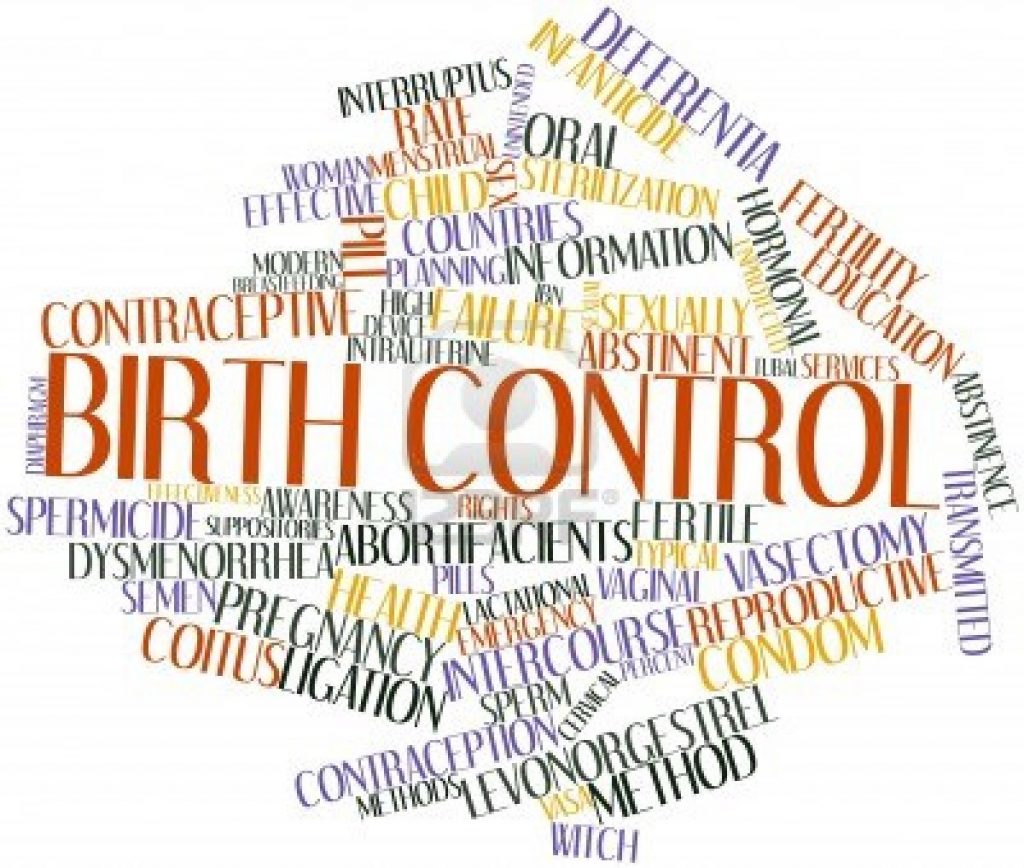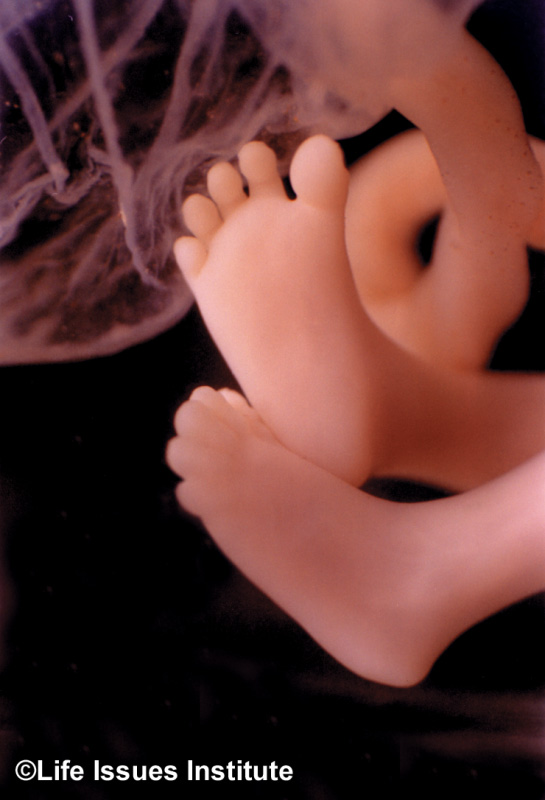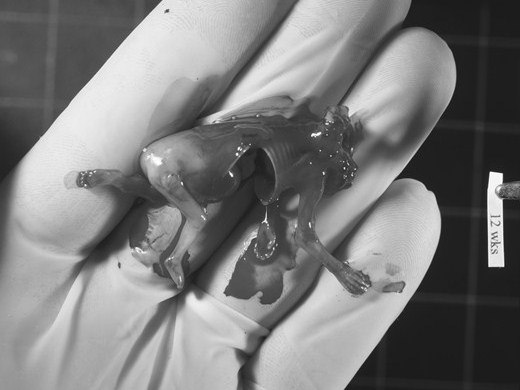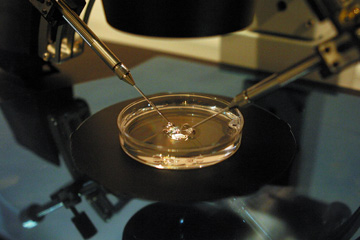In 2010 the Synod of the Netherlands Reformed Congregations in North America approved a report on In Vitro Fertilization, which was a 75-page, scientific and Biblical analysis of this so-called reproductive technology. The Reformed Pro-Lifer has asked one of the co-authors of this report to summarize the document. While much more could be said about this topic, please keep in mind the following is a summary of the original report. We are grateful for Rev. Sonnevelt’s willingness to provide this to us, and for the opportunity to make it available to our readers.
INTRODUCTION
Due to increasing medical and technological advances, as individuals, office-bearers, and as a church family we are also confronted with more difficult decisions. This is especially true when married couples are unable to naturally conceive a child, and some are considering In Vitro Fertilization (IVF) as an option while others have already made use of this technology.
Technically speaking, it is possible to use IVF in such a way that there is no loss of life involved. Some couples choose to have only one egg cell (or two) harvested from the woman and to have this fertilized by the sperm of the husband in a laboratory setting. They refrain from quality control and have all zygotes implanted into the uterus of the woman, hoping that this may lead to further gestation and the birth of a healthy child. As no extra embryos are engendered or frozen, the sixth commandment is not violated. And as there is no third party (donating ova or sperm), the seventh commandment is not transgressed. Some of these couples explain that they follow this method in dependency upon the Lord. They defend their stance by saying that the abuse of a method does not discard a proper use of it.
Thus, we need to consider whether it is right, from a Biblical and moral perspective:
- To make use of this method even when it is strictly confined to the two marriage partners;
- To use IVF when no embryos are lost in the process due to generally practiced “quality control”;
- To let some of the newly conceived embryos be frozen even when the couple says they want to implant these in the future?
Some underlying questions and points for further reflection:
- Is the beginning of a human being not something that takes place, under God’s blessing, as a result of the intimate union between a man and his wife? Is IVF not a crossing of boundaries marked by the Creator and a violation of the dignity of the human life? Can the (natural and understandable) desire for children co-exist with the application of a method like IVF?
- Is it legitimate to make use of a method that could only be established after many experiments and with the loss of much human life, a method that leads many today to choose the best embryos they want and to reject those of an “inferior quality”?
- Is it acceptable to freeze tiny human beings in such a way? What are the implications of the fact that some of them may not survive this process? What to do with such embryos when the parents change their mind about using all of them or pass away as a result of an accident, etc.?
1. IN VITRO FERTILIZATION – WHAT IS IT?
A. A New Technique
In Vitro Fertilization is a medical procedure in which mature egg cells are removed from a woman’s ovary after she has taken fertility drugs to cause a number of eggs to mature at the same time. Semen is collected from the man, which is joined with the egg in a glass dish where conception then takes place. New life is allowed to develop for some days, and either inserted into the uterus of the same or another woman for normal gestation and birth, or frozen and stored for later use.
Infertility is a growing problem and there has been a corresponding growth in reproductive technologies to provide a solution. An entire “industry” has emerged with little or no regulations to protect the interests of the men, women or children involved. The many techniques used to overcome infertility have profound moral implications that we should be aware of. For example, children produced through technical processes are generally subjected to “quality control” and eliminated if found “defective,” resulting in the death of countless newly conceived human beings. Yet, some find it unnecessary to examine the morality of IVF if it is practiced in the way the introduction describes it, involving a husband and wife who use means to overcome a medical problem: infertility. But the question must be asked: Does the procedure violate human dignity and the marriage act and should it be avoided? Is IVF moral or immoral?
Obviously, IVF eliminates the marriage act as the means of achieving pregnancy. New life is not created through an act of love in the closest union possible between husband and wife but by a laboratory procedure. Husband and wife are merely sources for the “raw materials” which are manipulated by a technician to cause the sperm to fertilize the egg. Not infrequently, “donor” eggs or sperm are used. Thus, the genetic father or mother of the child could be someone from outside the marriage, causing much confusion for the child. The identity of the “donor” may never be known, which purposely deprives the child of an awareness of his or her own lineage.
Nevertheless, even if the egg and sperm come from husband and wife, are there not other moral issues that arise? Routinely, several embryos are brought into existence but only those with the most potential are implanted in the womb. The others are discarded or used for experiments. This is a terrible offense against human life. While a little baby may be born because of IVF, many other lives are usually snuffed out in the process.
IVF is also very expensive, often costing at least $10,000 per attempt, while over 75% of the embryos created perish at some point in the process. In order to reduce costs and increase success rates, doctors may implant five or more embryos in the mother’s womb. This may result in more babies than a couple wants. To avoid carrying and giving birth to “too many” babies, doctors engage in what is called fetal or selective “reduction,” which means babies in utero are monitored to see which are to be eliminated. Then the “less desirable” babies are killed by filling a syringe with potassium chloride and thrusting the needle into the selected baby’s heart. The potassium chloride kills the baby within minutes, and he or she is expelled as a miscarriage. Again we see the unspeakable diminishing of the value of human life which can arise from this procedure.
Not everyone who has had a child through IVF has used donor eggs or sperm or killed unwanted babies in the course of the pregnancy. Yet there is still a moral problem with the procedure itself. The dehumanizing aspects of this procedure are even evident in the very language associated with it, such as reproductive technology industry, products of conception, and reduction. Inherent in IVF is the treatment of children, in their very coming into being, as less than human beings.
B. Designer Babies
Sperm and eggs are being bought and sold, and wombs are being rented. Typical prices for sperm are $1,800, for ova $6,500, and for surrogate motherhood $45,000. Couples from around the world come to the US to choose not only the sex of their child but also “cosmetic” features, such as hair and eye color. Incredibly expensive genetic testing also “helps” to identify defects so that children of inferior quality can be aborted. All of these are the first steps toward the “designer baby.”
Many of these technologies border on the quality of human life ethic, while the Bible’s eternal perspective teaches us that human life itself is of higher value. In Exodus 4:11 God speaks to Moses: “Who hath made man’s mouth? Or who maketh the dumb, or deaf, or the seeing or the blind? Have not I, the LORD?” The fact that God creates human beings in His image establishes value, not our height, or sight, or hearing.
We must realize that values like unpredictability, diversity, and uniqueness are central to God’s creation. Some genetic technologies violate these values. Does man know how to exercise wisely the power and control that these procedures bring? With the reality of sin ever before us, it is difficult to answer in the affirmative. That is why the prudent, biblical stance is that if a procedure will likely and eventually violate biblical guidelines, it is imperative to turn around and not to proceed at all.
C. Immoral Madness
In July 2009, British scientists reported having coaxed the first human sperm cells from embryonic stem cells. They used days-old human embryos, leftovers from IVF treatment, and isolated stem cells out of them. After being treated chemically, the stem cells developed into full-grown sperm cells within a couple of weeks. This research triggered criticism, not only because of the low quality of the developed sperm cells, but also because of ethical objections to this method. Interviewed by the BBC, Josephine Quintaville declared, “This is an example of immoral madness. Perfectly viable embryos have been destroyed in order to create sperm over which there will be huge questions of their healthiness and viability. It’s taking one life in order to perhaps create another. I’m very much in favour of curing infertility, but I don’t think you can do whatever you like.”
Current legislation in the United Kingdom forbids use of this sperm for the creation of children but in most countries public policies lag behind the pace in which technology advances. While the researchers denied having the intention of “producing human life in a dish,” others have already questioned whether women will still need a man to create a child in the future, thereby further eroding God’s institutions.
D. Frozen Embryos
In Vitro Fertilization has also produced another significant side effect, which is the presence of over 400,000 frozen embryos in the United States alone. This number grows each year when people utilizing IVF no longer want the embryos, leaving clinics with the dilemma of whether to sustain them in the frozen state or discard them. Embryos can remain viable for a decade or more if they are properly frozen, but not all survive when thawed. Some couples and clinics donate frozen embryos to scientific research, but this raises profound ethical questions due to the nature of the research and the loss of human life involved.
The frozen embryos press our society with the question of how to view them: Are they of value and worth? Most couples are not happy with destroying the embryos they created through IVF. This dilemma has meanwhile created the opportunity for people to even adopt frozen embryos. During congressional hearings concerning stem-cell research, John Borden stood before the panel with both his sons in his arms and asked, “Which one of my children would you kill?” John and his wife, Lucinda, unable to have children of their own, adopted frozen embryos that were “left over” from In Vitro Fertilization. Their striking testimony demonstrated that embryos are human beings in an early stage of development and therefore should not be sacrificed for embryonic stem-cell research.
If life begins at conception (as the Bible teaches us), reproductive technology has produced a gut-wrenching dilemma, in particular because there is no ethical consensus in the culture. Sadly, by disregarding God’s clear directives (e.g., Psalm 139:16), we are now left to deal with this consequence of In Vitro Fertilization, and the large majority of these small human beings will die when used for research or by being left in the freezer for too long.
2. WHAT THE BIBLE SAYS
A. God – the Creator of Life
Many texts in God’s Word shed light on the beginning of life. The act of creation uniquely belongs to a Triune God alone, as evident from some of the very first words spoken in Scripture, “Let Us make man” (Gen. 1:26). Moreover, in Isaiah 44:24 we read, “Thus saith the LORD, thy Redeemer, and He that formed thee from the womb, I am the LORD that maketh all things; that stretcheth forth the heavens alone; that spreadeth abroad the earth by Myself.”
Consider also Job 10:10-12 and 31:15, Ecclesiastes 11:5, and Isaiah 44:2 and 46:3. These passages show that God’s eye is upon everything that has been made, in a special sense upon living creatures, and in a very special sense upon human beings. His eye is also upon the children (Jonah 4:11), upon the unborn child (Ps. 139:14-16), and even upon the seed out of which children come into existence (Gen. 39:8-10).
B. Man – A Unity of Body and Soul
Basic biology shows us that conception is the beginning of a new individual so even at the first, single-cell stage of existence it is fully a human being. It is human, alive, and genetically distinct from the mother, and breathes and consumes nutrients as a whole, separate being. It only needs to grow and develop in the right environment to become an embryo and then a fetus, just like it will become an infant, toddler, child, adolescent, and finally an adult. This, by itself, should be enough to reject abortion and all IVF practices which lead to the death of the unborn child.
Another question is whether an unborn child already has a soul. The Bible instructs us that man consists of two essential elements: body and soul, as can be seen in the following verses.
- “And the LORD God formed man of the dust of the ground, and breathed into his nostrils the breath of life; and man became a living soul” (Gen. 2:7).
- “And fear not them which kill the body, but are not able to kill the soul: but rather fear Him who is able to destroy both soul and body in hell” (Matt. 10:28).
God made our bodies in a wondrous manner, about which the poet of Psalm 139 cried out, “I will praise Thee; for I am fearfully and wonderfully made: marvelous are Thy works; and that my soul knoweth right well” (vs. 14). God also gave man a never-dying soul. This soul, the principle of life in a physical, moral, and spiritual sense, is a very precious gift. “For what is a man profited, if he shall gain the whole world, and lose his own soul? And what shall a man give in exchange for his soul” (Matt. 16:26).
The debate about when the soul enters the body of a human being has gained a new dimension in light of the abortion movement. Many regard an unborn baby as a cluster of human cells without personhood, which has far-reaching consequences. According to God’s Word, a human being consists of body and soul. Denying the unborn child a soul is the equivalent of saying that he or she is not fully a human person yet.
The Scriptures give a strong indication that every person has a soul from the time of conception. We read that Jeremiah was already sanctified and ordained as a prophet while in the womb (Jer. 1:4-5), and that John the Baptist leapt for joy in his mother’s womb when Elizabeth heard the salutation of Mary, who was pregnant with the Lord Jesus (Luke 1:41, 44). Other significant texts show that man is considered a sinner by God from the time of his conception, which implies the existence of a soul.
- “Behold I was shapen in iniquity; and in sin did my mother conceive me” (Ps. 51:5).
- “Among whom also we had our conversation in times past in the lusts of our flesh and of the mind; and were by nature children of wrath, even as others” (Eph. 2:3).
Although Rev. G.H. Kersten says in his Reformed Dogmatics that it cannot be known with certainty when the soul enters the body, he writes in his explanation of the Heidelberg Catechism, “From the hour of our conception until we draw our last breath, our sins cry out for the just penalty of death” (page 5). Additionally, the Heidelberg Catechism, when speaking about the profit of “Christ’s holy conception and nativity” says “That He is our Mediator, and with His innocence and perfect holiness, covers in the sight of God, my sins, wherein I was conceived and brought forth” (Lord’s Day 14, Question and Answer 36).
While it is hard to prove the soul’s presence at conception, this is true at any time. We know that all genetic material is present at conception; nothing is added later. And Scripture passages overwhelmingly suggest that human beings have a soul from the very moment of conception. The implications regarding the issue of IVF is that every time an embryo is killed in the process, either intentionally or unintentionally, and every time that a frozen embryo does not survive the procedure to which it is subjected, not only human life is lost, but a precious soul also enters eternity.
C. Children – a Gift of God
God alone is the Author of life and children are an inheritance from Him, as we can see in Psalm 127:3: “Lo children are an heritage of the LORD: and the fruit of the womb is His reward.” Couples who are without children often experience this as a heavy cross. It is important that office-bearers have an eye for this sorrow and approach childless couples with compassion.
In biblical times, childlessness was a double cross, not only because of the natural desire inherent to all human beings, but also since God’s blessing was seen in outward prosperity more than in the New Testament. Furthermore, since God had promised the Savior’s birth in due time, having no children meant that the Messiah could not be born from or greeted by one’s no descendants, nor could they receive His blessings in the future.
The Bible tells us about several barren women, some of whom were later blessed with children. We read about Sarah in Genesis 16:1-5, which shows that childlessness has been an issue almost from the dawn of history. We read about Rebekah in Genesis 25:21. It is remarkable that the wives of the first two patriarchs were unable to conceive until God opened their wombs, which makes the birth of Israel as a nation and even greater wonder of sovereign grace and supernatural power. Genesis 29 and 30 speaks about Rachel, for whom receiving a child had become an obsession, throwing even the favor of the Lord into the background. Even when she gave birth to Joseph, she was not satisfied, which ultimately became her ruin as she died while giving birth to Benjamin.
This history contains a solemn warning. How much reason there is for childless couples to watch against crossing the boundaries and becoming inordinate in their desire! God’s Word says, “Seek ye first the kingdom of God and His righteousness; and all these things shall be added unto you” (Matt. 6:33). Besides, it is the task of office-bearers to speak about these things in a pastoral way. What is the motive in seeking parenthood? Are there other desires, more important desires, in their lives? In seeking to receive a child and in asking for a child, is there something of Hannah’s desire and submission? For Hannah, childlessness was a cause of much grief, as we can read in 1 Samuel 1:6-11. She may have even wondered whether the Lord had rejected her, which was the greatest grief for her God-fearing soul. The outcome of this history shows that the Lord undertook for her. Indeed, children are a gift of the Lord.
D. God’s Sovereignty and Man’s Responsibility
When thinking about childlessness and the issue of IVF, we should also take into account what the Bible says about God’s sovereignty and man’s responsibility. In Genesis 1:26 and following, God created humans––both male and female––in His image and then gave them the charge to “be fruitful and multiply, and fill the earth and subdue it; and rule over the fish of the sea and over the birds of the sky, and over every living thing that moves on the earth” (1:28). Verse 29 extends this dominion to plants, trees, and seeds. Although colored by the reality of human sin, this dominion status is repeated for Noah in Genesis 9:1-2. Reproductive and genetic technologies fall under the stewardship responsibility of humans as well.
This has powerful implications. While these technologies give humans power never realized before, we must remember that God is the Creator and we are only creatures. He is sovereign; we are stewards. And due to sin we have an inborn inclination to take matters into our own hands. Our will being totally depraved, we are prone to raise our fist against the Lord and to question His wisdom and goodness concerning His ways. We want to be our own master, and it is only by grace when we may learn to bow under God’s sovereign will.
E. The Providence of the Lord
Another biblical truth, closely connected with those mentioned in the previous paragraph, is that of God’s providence. Let us quote from our confession, The Heidelberg Catechism, Lord’s Day 10.
Q. 27. What dost thou mean by the providence of God?
A. The almighty and everywhere present power of God; whereby, as it were by His hand, He upholds and governs heaven, earth, and all creatures; so that herbs and grass, rain and drought, fruitful and barren years, meat and drink, health and sickness, riches and poverty, yea, and all things come, not by chance, but by His fatherly hand.
Q. 28. What advantage is it to us to know that God has created, and by His providence doth still uphold all things?
A. That we may be patient in adversity thankful in prosperity; and that in all things, which may hereafter befall us, we place our firm trust in our faithful God and Father, that nothing shall separate us from His love; since all creatures are so in His hand, that without His will they cannot so much as move.
3. CONSIDERATIONS
A. Reflections – Biblical and Pastoral
We feel much empathy for married couples who struggle with infertility and yearn to have children. Yet we should not forget that God is free and sovereign in all His dealings. We ought to realize that all human plans fail when He does not add His blessing. As well, we should be careful not to cross the boundaries of what is permitted in light of God’s Word.
The examples of Sarah, Rebekah, Rachel, and Hannah show that God is a surprising God. “Is anything too hard for the LORD?” (Gen. 18:14). “Behold, I am the God of all flesh: is there anything too hard for Me?” (Jer. 32:27). “For with God nothing shall be impossible” (Luke 1:37). It would be to God’s honor if children are received in the way of a wonder, just as it would to God’s honor if He grants submission to His will, even in withholding what is dearest to us. There is sweetness in such submission to Him (1 Sam. 1:8).
Since man is the crown of God’s creation, humans may never be used as a means to an end, not even to overcome infertility. In IVF, children are produced through a technical process and in their very coming into existence they are subjected to the arbitrary choices of those bringing them into being, rather than brought about by the providence of the Author of creation Himself. Bringing the sperm and egg together in a glass dish to bring about fertilization is a highly technological procedure in which procreation and marital intercourse are disconnected (see the article of Prof. Dr. W.H. Velema under Appendix 3 of the original report). It is therefore our conviction that in following this procedure a man and woman, even when it concerns a married couple, transgress the God-given boundaries.
Moreover, this procedure has been established at the expense of many lives of unborn children and continues to do so. It has also opened the way to a host of other problems, as discussed previously. Even if a couple uses IVF by only using one or two eggs, having all embryos implanted, and refraining from freezing them, this way of using the procedure is only possible due to years of experimentation which has costs hundreds of thousands of embryos their lives.
Finally, IVF has also opened the door to a host of other horrible sins. Use of donor eggs and sperm, also by gay and lesbian couples, clearly infringes upon the marriage union and breaks the seventh commandment of God’s holy law. The very children who must gratify the desires of their genetic, biological, or social parents have to pay the price, many of whom have much higher rates of sustaining genetic or birth defects. Can we close our eyes to all these side effects of this technology in our apocalyptic culture? Is it fair and realistic to highlight a so-called proper use of this technology when there is so much abuse of it? Should we not even hate the garment spotted by the flesh (Jude:23)?
B. How to Overcome Fertility – Lawful and Unlawful Means
The Bible is not against using means, provided that those means are legitimate and are sought in dependency upon the Lord. Any number of morally acceptable interventions may be used to take away infertility. For instance, surgery can overcome tubal blockages in the male or female reproductive system; fertility drugs may be used, with the caution that multiple pregnancies may put mother and infants at risk; and ways to track natural reproductive cycles may enhance the chances for achieving pregnancy.
The church has great compassion for those who suffer from infertility. Out of love for all human life and respect for the integrity of marital relations, however, the church teaches that some means of trying to achieve pregnancy are illicit. Some of these means and methods actually involve the taking of innocent human life, or treating human life as a means toward the end of “manufacturing a product.” Methods such as these do violence to the dignity of the human person.
In our modern Western world, we have a tendency to think that we can solve all our problems with the right “technology” but children were never intended to be engendered by technology or produced by an industry. For that reason, we reject IVF as a God-dishonoring and dehumanizing practice, not acceptable in any form or under any circumstances. In seeking the blessing of children, we must only use methods of which we can expect that God’s blessing and favor may rest upon them.
4. CONCLUSION
Our conclusions regarding In Vitro Fertilization are not rooted in one single motive but founded upon several arguments, each of which is sufficient to denounce the method of “producing babies” outside the mother’s womb and disconnected from the physical union between a man and his wife. Taken together, these arguments are all the more compelling to reject IVF as a way of alleviating the problem of infertility.
Let us take a firm stance in these troublesome times in which God’s Word is being undermined and in which the very foundations of life are shaking. Life is life, right from conception. From a scriptural as well as scientific viewpoint, there is no doubt about this fact. What is conceived in a Petri dish is not potential life either, but a very small human being with a soul for eternity.
Finally, when we see the developments in our world today, we must hang our heads in shame. When we notice the general declension in our culture, we should weep. How has it come so far? Did all these things go on in our nations and in our midst, while we were fast asleep? Instructed in the truth, we can no longer claim ignorance.
May the Lord grant unto us a heartfelt repentance and a turning from the paths of evil! May our ways be directed according to His Word, of which David said, “Thy word is a lamp unto my feet, and a light unto my path” (Ps. 119:105).












